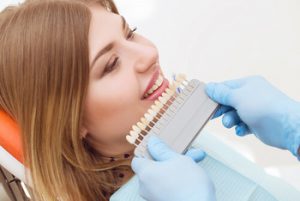In the quest for a brighter smile, dental veneers have emerged as a popular choice. These thin shells, tailored to fit perfectly over the front surface of existing teeth, can dramatically improve one’s overall appearance. But, like all good things in life, they require proper care to maintain their sheen. One common question that arises is: can you brush veneers once a day? Let’s delve deeper into this topic.
Decoding Dental Veneers
In the vast realm of cosmetic dentistry, dental veneers have established themselves as a quintessential remedy for a plethora of dental conundrums. These meticulously crafted facades, primarily derived from porcelain or composite materials, act as a saving grace for those eager to remedy the blemishes and imperfections that mar their smiles.
Confronted with discolouration? Bothered by noticeable gaps or unsightly chips? Veneers present a formidable solution. Among the two primary types, porcelain veneers stand out, not merely for their durability but also for their remarkable stain-resistant capabilities. Their uncanny ability to mirror the natural light-reflecting characteristics of real teeth sets them apart, offering an indistinguishable blend with the rest of the teeth.
Conversely, when it comes to addressing minor dental tweaks without venturing too deep into invasive procedures, composite veneers emerge as the preferred choice. Their versatility, combined with a gentler application process, makes them a darling for those wary of extensive dental interventions.
Veneers: A Smile Enhancement, Not a Hygiene Exemption

A radiant veneer-enhanced smile, while a confidence booster, is by no means a passport to neglect oral care. Beneath the protective shield of the veneers, your natural teeth and gum tissues continue their tryst with vulnerabilities. They remain at the mercy of familiar foes like tooth decay and gum disease.
Yes, veneers are expertly anchored to your teeth, steadfastly bonded using a potent bonding cement. However, this bond isn’t foolproof. Neglect your oral hygiene, and you’re courting potential complications, be it around the veneer’s margins or even in the concealed spaces beneath them.
Frequency of Brushing: Twice is Nice
One might ponder: With the protective shield of veneers, is a once-a-day brush adequate? The unequivocal response is a resounding ‘no’. To uphold the sanctity of both your veneers and the precious natural teeth they protect, a twice-daily brushing routine is non-negotiable.
This regimented approach ensures the eviction of insidious plaque build-up, safeguarding not just the veneers but also the supporting gums and adjacent teeth. The tool of choice for this task? A soft toothbrush, preferably one boasting gentle bristles, to ensure the veneer’s polish and surface remain unscathed.
Toothpaste Choices: Gentle is the Way Forward
In the post-veneer phase, the toothpaste you reach for assumes heightened significance. With veneers, abrasive toothpastes become persona non grata. Couple them with hard-bristled toothbrushes, and you’re inadvertently setting the stage for scratches and potential damage to the veneer’s lustre.
While veneers may flaunt resistance to decay, the same immunity isn’t shared by the underlying enamel or the neighbouring teeth. Thus, the importance of fluoride-infused toothpaste cannot be overstated. They play a pivotal role in maintaining a protective environment for the entirety of your oral cavity.
Flossing and the Electric Toothbrush Dilemma
Beyond brushing, the art of flossing gains paramount importance, especially when veneers enter the oral equation. Daily flossing, executed with precision, is instrumental in preserving the health of gums, particularly around those crucial veneer margins.
For those with a penchant for electric toothbrushes, a word of caution is in order. While these devices promise a thorough clean, it’s imperative they operate in a gentle setting. This meticulous approach promises a comprehensive clean, all the while ensuring your veneers remain unharmed, retaining their structural integrity and sheen.
Foods, Drinks, and Habits to Monitor
Veneers, especially porcelain veneers, are durable, but certain habits and foods can jeopardise their longevity:
- Hard Foods: Avoid foods that place undue stress on veneers. This includes hard candy, hard bread, and any food that requires biting down with significant force, especially with front teeth.
- Staining Substances: Though porcelain veneers are stain-resistant, composite veneers can be stained by substances like coffee, red wine, and soy sauce. Moderate your consumption or rinse your mouth promptly after consuming these.
- Teeth Grinding: Ensure you avoid teeth grinding, which can damage veneers. If you have a habit of grinding at night, discuss treatment options, like a night guard, with your dentist.
- Alcohol Consumption: Alcohol can weaken the bonding composite. While it’s okay to enjoy an occasional drink, refrain from consuming alcohol in large quantities frequently.
Regular Dental Check-Ups
It’s paramount to visit your dentist regularly after getting veneers. During these check-ups, your dentist can assess the health of your veneers, gums, and regular teeth. Tartar build-up, which can’t be removed by brushing alone, can be addressed during these visits. Additionally, regular dental visits ensure early detection of potential issues, such as gum recession or receding gums.
Potential Challenges
While veneers enhance smiles, there might be short-lived challenges. After the procedure, your gums might be a bit sore. This is normal and should subside in a few days. With porcelain veneers, you might feel that they’re a bit thicker than your natural teeth initially. However, in a few days, this feeling typically subsides.
Veneer Longevity: The Role of Good Oral Hygiene Habits

Veneers, when taken care of, can last many years. Their longevity is often a testament to the patient’s oral hygiene habits. Maintain good oral hygiene habits, which include brushing twice a day, flossing daily, and avoiding hard objects or foods; you can ensure that your veneers remain in pristine condition.
Additionally, products containing baking soda, which can be abrasive, should be used cautiously. Also, avoid using hard-bristled toothbrushes that can potentially harm the veneers.
Veneers: Beyond Aesthetics to Functional Relevance
Veneers aren’t just about amplifying one’s smile and aesthetic allure; they’re also about rectifying functional inadequacies. These thin laminates, whether porcelain or composite, serve as a protective shield for the underlying tooth. They buffer the teeth from external abrasive agents, potentially reducing the wear and tear that our natural dentition would otherwise endure.
Temperature Sensitivities and Veneers
While veneers act as a barrier, one might occasionally experience temperature sensitivities, especially in the initial days post-procedure. Hot brews or icy delights might invoke a mild sting or tingling sensation.
This arises due to the bonding process and the slight elevation that the veneer might introduce. It’s crucial not to misconstrue this as a permanent outcome. Over time, as the tooth and its surrounding tissues acclimate to the veneer, these sensitivities typically wane.
Veneer Finishing: The Art of Bite Adjustment
Upon veneer installation, dentists meticulously assess the bite, ensuring that the new additions don’t disrupt the natural occlusion or alignment. It’s a blend of art and precision, ensuring that the veneers interface seamlessly with the opposing teeth.
However, should you feel any bite discrepancies or areas of high pressure, it’s essential to address these with your dentist. Early adjustments can thwart undue stress on the veneers and promote their longevity.
Veneers and Ultrasonic Cleanings
Ultrasonic cleanings, a popular choice in dental hygiene, deploy sonic vibrations to dislodge plaque and tartar. For those sporting veneers, a word of caution is in order. It’s paramount to ensure that the ultrasonic tool doesn’t interface directly with the dental veneer edges.
Such direct contact might inadvertently introduce micro-chips or flaws. A skilled dental hygienist, familiar with veneer maintenance, will always navigate around these regions, ensuring the veneers remain uncompromised.
Wrapping Up
Dental veneers offer a transformative solution for those seeking an enhanced smile. However, like all dental solutions, they require care. Regular check-ups, combined with excellent oral hygiene habits, are the pillars of veneer longevity.
Brushing just once a day isn’t enough; twice is the golden rule. Combine this with proper flossing, regular dental check-ups, and a diet that respects your veneers, and you’ll be flashing that beautiful smile for many years to come.
Ready to learn more about veneers or need some guidance on their care? Dial Infinity Dental Care at (02) 9159 6237 for expert advice and information.
References:
https://www.ncbi.nlm.nih.gov/pmc/articles/PMC9952524/
https://www.nia.nih.gov/health/taking-care-your-teeth-and-mouth

